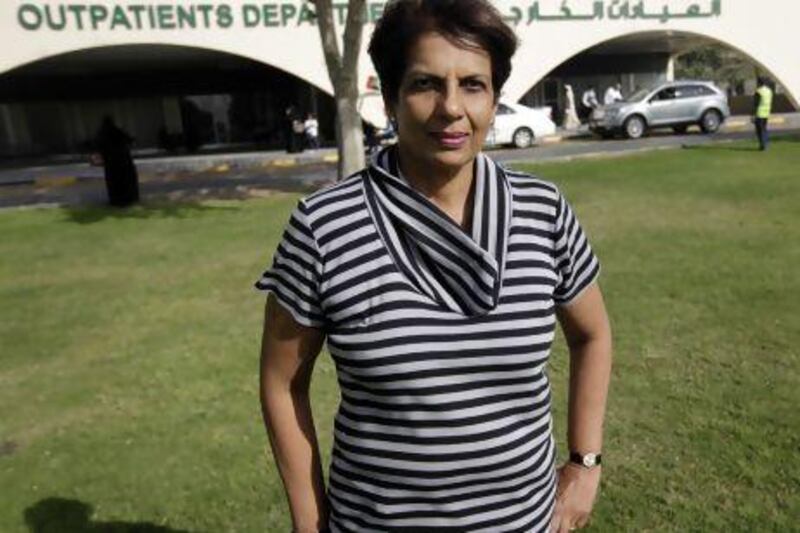ABU DHABI // When Dr Sunita Mehta self-examined her breasts and found a lump, her world ground to a halt.
With a sinking heart, she strongly suspected she had breast cancer. "As a 53-year-old who was post-menopausal, I knew straight away that the lump, which had not been there six months before, was malignant," she said.
Speaking about her experience to raise awareness of the importance of early breast screening, Dr Mehta said it was when she had temporarily left Abu Dhabi to take up a position as a family physician in Toronto, Canada, that she made the discovery.
After reading a news item about breast cancer in early 2005, Dr Mehta realised that in the whirlwind of her new job, she had not carried out a breast self-examination in six months.
She carried out a quick check and found a hard lump in her right breast. Immediately, Dr Mehta booked an appointment with her GP and was referred for a mammogram.
Flying home to visit her husband in Abu Dhabi, she had the examination at Mafraq Hospital, on the outskirts of the city.
Her worst suspicions were confirmed. Dr Mehta was told she had malignant cancer in her right breast and would need surgery. Although a lumpectomy was on the cards, Dr Mehta opted to have her entire breast removed to rid herself of any risk.
Giving up her job in Canada, she returned to Abu Dhabi and, following the surgery, underwent four courses of chemotherapy.
Dr Mehta now has annual check-ups at Mafraq Hospital to determine if the cancer has returned, but today she is optimistic that she is cancer-free.
Speaking about her experience as Mafraq relaunches its annual drive to raise awareness of breast cancer, Dr Mehta, now 60, said early detection is key to survival.
"I have known women who have died from breast cancer and I have known women who have lived," she said.
"Early detection is so important. Women should perform self-examinations regularly and get a mammogram after the age of 40 or, if there is a history of breast cancer in the family, get a check-up earlier."
Mafraq Hospital's annual breast cancer health initiative is called "Ana Rosa". It aims to educate women about breast cancer and offer information on medical screening and preventative measures against the country's most common cancer.
Dr Rola Shaheen is fronting the campaign, which aims to reach out and help thousands of women. Last year the campaign reached 6,000 women, she said.
"Screening for women over 40 years of age is a must," she said, "while high-risk patients may need to start at an earlier age."
But of course, not every case fits the mould. Dr Cambria Russell, a US expatriate living and working in Ras al Khaimah, was in her thirties when she discovered she had triple negative breast cancer.
Several years after the diagnosis, and her successful treatment, Dr Russell, who has two young children, is back to work and, on occasion, helping young women talk about breast cancer - from how important it is to check for it, to how best you can support someone dealing with it.
Leading a discussion last week at the American Academy in Al Mizhar, Dubai, Dr Russell spoke to a room full of students about how she, and her family and friends, coped with the situation.
Hearing directly from a person who has been affected by cancer puts other things into perspective, said 17-year-old Maral Berenjian, an Iranian student at the school.
"It's very eye opening. You value your blessings more. You understand that all the first world problems basically just diminish. When you a see a women like [Dr Russell] talking...it's very important."
Young female adults do not generally talk about cancer unless they have been personally affected by it, said the teenager. By facing the issue head on, the topic becomes easier to speak about, she added.
Having publicly discussed her story before, including taking part in talks during breast cancer awareness month, it is imperative that young women are exposed to information on breast cancer, said Dr Russell.
"I think that it's important that they get used to hearing about these things because they are significant for their health," said the doctor, who attended last month's Oscars after starring in Mondays at Racine, a film that focuses on a beauty salon that helps women going through chemotherapy, and which was nominated for an Academy Award for Best Documentary (Short Subject).
"If they go through their whole schooling and no-one has ever said the word 'breast', or 'nipple' to them, when they do find something wrong, it's likely they'll be embarrassed to talk to their mother, their doctor - to anyone about it," said the doctor.
"The more exposure they have to the normalcy of discussing these issues, the safer they are."
jbell@thenational.ae
zalhassani@thenational.ae





